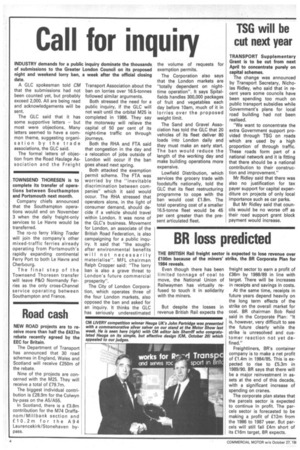Call for inquiry
Page 8

If you've noticed an error in this article please click here to report it so we can fix it.
INDUSTRY demands for a public inquiry dominate the thousands of submissions to the Greater London Council on its proposed night and weekend lorry ban, a week after the official closing date.
A GLC spokesman told CM that the submissions had not been counted yet, but probably exceed 2,000. All are being read and acknowledgements will be sent.
The GLC said that it has some supportive letters — but most were objections. Many letters seemed to have a common theme, suggesting organisation by the trade associations, the GLC said.
The formal letters of objection from the Road Haulage Association and the Freight Transport Association about the ban on lorries over 16.5-tonnes followed similar arguments.
Both stressed the need for a public inquiry, if the GLC will not wait until the orbital M25 is completed in 1986. They say the motorway will relieve the capital of 50 per cent of its night-time traffic on through journeys.
Both the RE-IA and FTA said that congestion in the day and a relocation of jobs outside of London will occur if the ban goes ahead next spring.
Both attacked the exemption permit scheme. The FTA was worried by the "inevitable discrimination between companies" which it said would occur. The RHA stressed that operators alone, in the light of consumer demand, should decide if a vehicle should travel within London. It was none of the GLC's business. Movement for London, an associate of the British Road Federation, is also campaigning for a public inquiry. It said that "the soughtafter environmental benefits will not necessarily materialise". MFL chairman Ralph Cropper said: "The lorry ban is also a grave threat to London's future commercial prosperity".
The City of London Corporation, which operates three of the four London markets, also opposed the ban and asked for an inquiry. It thinks the GLC has seriously underestimated the volume of requests for exemption permits.
The Corporation also says that the London markets are "totally dependent on nighttime operation". It says Spitalfields handles 300,000 packages of fruit and vegetables each day before 10am, much of it in lorries over the proposed weight limit.
The Sand and Gravel Association has told the GLC that 20 vehicles of its fleet deliver 80 loads into London daily and they must make an early start. The ban would reduce the length of the working day and make building operations more expensive.
Lowfield Distribution, which services the grocery trade with foodstuffs nationally, told the GLC that its fleet restructuring programme to cope with the ban would cost £1.8m. The total operating cost of a smaller 16.5-tonne fleet would be 45 per cent greater than the present articulated fleet.


















































































































